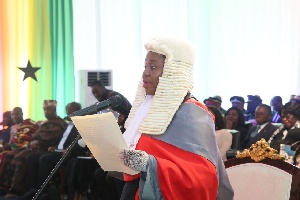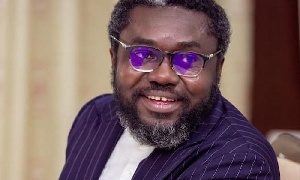- Home - Entertainment
- Lifestyle News
- Year In Review
- Music News
- Entertainers
- Entertainment Archive
- Entertainment Photos
- Jokes
- Entertainment Headlines
- Ameyaw Debrah
- Brown GH
- Celebrities Buzz
- GH Base
- Ghana Celebrities
- Gh Gossip
- GH Page
- GH Splash
- Hot Gossip GH
- YEN
Television of Wednesday, 9 April 2025
Source: www.ghanawebbers.com
Supreme Court indefinitely adjourns hearing on suit challenging processes to remove Chief Justice
The Supreme Court has postponed the hearing of a suit against Chief Justice Gertrude Torkornoo.
The case was filed by Old Tafo MP Vincent Ekow Assafuah. It was set to be heard on Wednesday, April 9.
However, the court adjourned because 50 State Attorneys were unavailable. They were attending training for representation at the ECOWAS Court.
A new date for the hearing has not been announced yet.
The suit questions the constitutional process followed by President John Mahama. He received three petitions calling for the Chief Justice’s removal.
Mr. Assafuah seeks a declaration that the Chief Justice should respond to allegations first. This is before any consultations with the Council of State under Article 146(6) of the 1992 Constitution.
Assafuah, represented by former Attorney-General Godfred Dame, argues that not notifying her violates her right to a fair hearing. He claims this undermines judicial independence.
There is also a similar suit at the Supreme Court from a private citizen. The court will determine if the President's actions follow constitutional provisions for removing a sitting Chief Justice.
Meanwhile, the Chief Justice has responded to the petitions after being given ten days by the President. Joy News sources say she has complied and next steps are expected to continue.
Legal experts suggest that recent developments may render this case moot.
Article 146 outlines procedures for removing Justices of Superior Courts and Chairmen of Regional Tribunals:
1) A Justice or Chairman can only be removed for misbehavior or incompetence.
2) Removal must follow specified procedures in this article.
3) If a petition is received, it goes to the Chief Justice for evaluation.
4) If there is a prima facie case, a committee will be formed to investigate.
5) This committee will make recommendations to the Chief Justice and then to the President.
6) For removing a Chief Justice, a special committee will be appointed by the President.
7) This committee will recommend whether removal should occur.
8) All proceedings are confidential; those accused can defend themselves.
9) The President must act according to committee recommendations.
10) The President may suspend justices based on advice from relevant councils.
11) Suspensions can be revoked at any time by the President.











